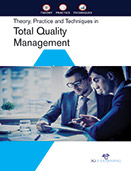Business and Management

Quality is a perceptual, conditional and slightly particular attribute of a product or service. A business will benefit most through focusing on the significant procedures that deliver their customers with products and services. Producers may measure the conformance quality, or degree to which the product or service was made according to the required specification. Conversely, customers may focus on the quality specification of a product or service, or compared it with those that are available in the marketplace. In a modern global marketplace, quality is a key competency which companies derive competitive advantage. Attaining quality is fundamental to competition in business in driving business into new pinnacles. Total quality management (TQM) is a firm-wide management philosophy of continuously improving the quality of the products/services/processes by focusing on the customers’ needs and expectations to enhance customer satisfaction and firm performance. Many quality management philosophies, methodologies, concepts and practices were created by quality gurus to manage quality of product and service in an organization. These practices have evolved over time to create sustainable sources of competitive advantage. New challenges faced by managers are addressed to improve organization’s performance and future competition. In the total quality management form, it is a structured management system adopted at every management levels that focused on ongoing effort to provide product or service. Its integration with the business plan of the organization can exact positive influence on customer satisfaction and organizational performance. Effective knowledge management ensures that employees obtain timely reliable, consistent, accurate, and necessary data and information as they need to do their job effectively and efficiently in the firm. Only in this way, the expected benefits from TQM practices can be achieved. Process management emphasizes activities, as opposed to results, through a set of methodological and behavioral activities. It includes preventive and proactive approaches to quality management to reduce variations in the process and improve the quality of the product.
“Theory, Practice and Techniques in Total Quality management” deals with quality and total quality, cost of quality, linking quality management system to organizational performance, its impact on organizations and approaches of implementing TQM and the quality journey. It investigates impacts of TQM practices on various performance measures as well as the reasons and the barriers of the TQM practices of organizations. This book has been designed with the premise that no organization can survive in an increasingly competitive business environment unless its primary focus is on offering quality products and services.